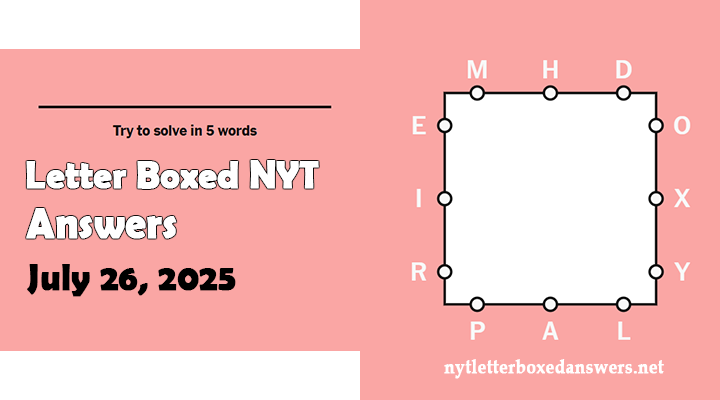NYT Letter Boxed quiz for Saturday July 26, 2025 is released. We came up with Letter Boxed July 26 2025 Answers and Hints for you. With the help of these hints, you will be able to guess the words of letter boxed quiz without revealing the answers and get the solution.
| Top | Right | Bottom | Left |
|---|---|---|---|
| MHD | OXY | PAL | EIR |
| Two Words Solution | ||
|---|---|---|
| HYDROPHILE | EXAM | |
| HYDROPHILIDAE | EMPEXA | |
| HYDROPHILIDAE | EXAM | |
| HYDROPHILIDAE | EXILEDOM | |
| Three Words Solution | ||
|---|---|---|
| AMPHORA | AXE | EYELID |
| AMPHORA | AXED | DOILY |

Word 01:
10-letter word, starts with H, ends with E; substance that has an affinity for water.
Attracts and dissolves well in water.
Opposite of hydrophobic.
A term used in chemistry and biology.
Common in soap molecules.
Helps substances mix with water.
Often found in polar compounds.
Water-loving by nature.
Detergents often have this property.
Crucial for cellular and chemical interactions
Word 02:
4-letter word, starts with E, ends with M; test of knowledge or skill.
Common in schools and universities.
A midterm or final is one.
You study hard before this.
Could be written or oral.
Determines grades or qualifications.
Students often fear this.
Needs preparation and focus.
May include multiple choice or essays.
Assesses what you’ve learned.
Word 01:
14-letter word, starts with H, ends with E; scientific family name for water scavenger beetles.
Aquatic beetles belonging to this family.
Insect classification ending in -dae.
Found in freshwater environments.
Name derives from Greek for “water-loving.”
Family of beetles adapted to wet habitats.
Lives in ponds, lakes, and marshes.
Often mistaken for other aquatic beetles.
Known for their swimming ability.
Recognized by entomologists worldwide.
Word 02:
6-letter word, starts with E, ends with A; fictional or invented word (no standard dictionary meaning).
Appears as a potential code or invented term.
May be used in games or fantasy names.
Could function as a unique username.
Looks like a mix of Latin and modern roots.
Not a standard English word, but suggestive of command or prefix “ex-.”
Might be mistaken for a brand or tech term.
Possible placeholder or coined expression.
Could be imagined as a product name.
Has exotic, techy sound.
Word 01:
14-letter word, starts with H, ends with E; scientific family name for water scavenger beetles.
Aquatic beetles belonging to this family.
Insect classification ending in -dae.
Found in freshwater environments.
Name derives from Greek for “water-loving.”
Family of beetles adapted to wet habitats.
Lives in ponds, lakes, and marshes.
Often mistaken for other aquatic beetles.
Known for their swimming ability.
Recognized by entomologists worldwide.
Word 02:
4-letter word, starts with E, ends with M; test of knowledge or skill.
Common in schools and universities.
A midterm or final is one.
You study hard before this.
Could be written or oral.
Determines grades or qualifications.
Students often fear this.
Needs preparation and focus.
May include multiple choice or essays.
Assesses what you’ve learned.
Word 01:
14-letter word, starts with H, ends with E; scientific family name for water scavenger beetles.
Aquatic beetles belonging to this family.
Insect classification ending in -dae.
Found in freshwater environments.
Name derives from Greek for “water-loving.”
Family of beetles adapted to wet habitats.
Lives in ponds, lakes, and marshes.
Often mistaken for other aquatic beetles.
Known for their swimming ability.
Recognized by entomologists worldwide.
Word 02:
8-letter word, starts with E, ends with M; the state or domain of being in exile.
Invented compound of “exile” + “dom.”
Suggests a condition of banishment.
Similar in form to “kingdom” or “freedom.”
Could describe life away from one’s homeland.
Poetic way to say prolonged exile.
Implies a realm or rule of outcasts.
Used figuratively in fantasy or literature.
Conveys loneliness or forced absence.
A coined word blending place and status.
Word 01:
7-letter word, starts with A, ends with A; ancient jar with two handles and narrow neck.
Used in Greece and Rome for storage.
Typically held wine, oil, or grain.
Often found in archaeological digs.
Decorated pottery from ancient times.
Had a pointed bottom for transport.
Displayed in museums of antiquity.
Common in trade across the Mediterranean.
Made of clay and sometimes painted.
Iconic shape in classical art.
Word 02:
3-letter word, starts with A, ends with E; tool with a heavy blade for chopping.
Used to split wood or fell trees.
Has a sharp edge and a long handle.
Weapon of choice for Vikings.
Symbolic in lumberjack imagery.
Can also mean to cut jobs or cancel.
Classic tool of executioners.
Often associated with physical labor.
Found in survival and camping kits.
Homophone of a question word in slang (“ask”).
Word 03:
6-letter word, starts with E, ends with D; thin fold of skin protecting the eye.
Opens and closes to blink.
Protects from dust and light.
Involuntary movement during sleep.
Where mascara and eyeliner are applied.
Moves reflexively when something nears the eye.
Part of the face with lashes.
Can droop due to fatigue.
Works with tear ducts to clean eyes.
Shields the cornea when shut.
Word 01:
7-letter word, starts with A, ends with A; ancient jar with two handles and narrow neck.
Used in Greece and Rome for storage.
Typically held wine, oil, or grain.
Often found in archaeological digs.
Decorated pottery from ancient times.
Had a pointed bottom for transport.
Displayed in museums of antiquity.
Common in trade across the Mediterranean.
Made of clay and sometimes painted.
Iconic shape in classical art.
Word 02:
4-letter word, starts with A, ends with D; past tense of being removed or cut.
When a show gets canceled, it gets ___.
Can refer to being fired from a job.
Describes sudden removal.
Newspaper headlines use this for drama.
Related to layoffs or cuts.
Harsh and abrupt decision outcome.
Past form of using a chopping tool.
May apply to project terminations.
Associated with bad news in business.
Word 03:
5-letter word, starts with D, ends with Y; ornamental mat often placed under dishes.
Often made of lace or paper.
Used for decoration on tables.
Found in tea parties or vintage setups.
Decorative craft item with a circular design.
Associated with grandmas and old-fashioned charm.
Prevents scratches or marks on furniture.
Sometimes seen under cakes or pastries.
Typically white and delicate.
Adds an elegant touch to a setting.

Chris Brown is a passionate word game love and problem solving expert. With over 15 years of experience in solving puzzle challenges, he provides daily NYT Letter Boxed answers, tips and strategies to help other players so that they can improve their solving skills. Whether you are stuck on a tricky puzzle or looking for new techniques, Chris is here to guide you with his expert solutions.